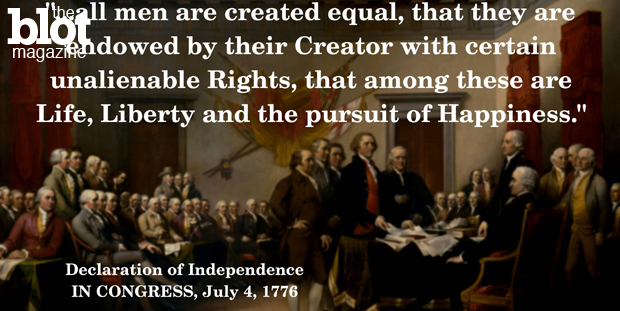
I doubt that particular phrase will ever be sung at baseball games, but when the land of “life, liberty and the pursuit of happiness” gets the ultimate civil rights violation callout by the convention it helped birth, there is a serious problem.
United Nations Calls Out United States
In March 2014, the United Nations issued a report that clearly documented numerous basic human rights violations the United States was found guilty of committing, including acts of torture, racial profiling, spying on U.S. citizens and more. To no one’s surprise, the international community was not only in full agreement with the findings, but some U.N. representatives were even quite vocal about their approval. José Luis Díaz, a U.N. representative from Amnesty International, was quoted as saying:
“The U.S. is adept at demanding human rights change from other governments while failing to meet international standards itself.”
In all, the U.N. hit the United States government with 25 human rights violations, many of which U.S. citizens have been decrying for years, without their voices being heard, much less taken seriously. But has the U.S. always been such a hotbed for this type of under-the-radar-civil rights abuses? Not really. Our history, though dodgy and high-strung, has had a few milestones of civil rights movements that have shaped the legal system in not only the United States, but the world as well. It’s sickening to see just how far these former standards of fair treatment have fallen and unconscionable to think that it took a council thousands of miles away to publicly rebuke the U.S. for its unpardonable infractions against civil liberties when the country’s own citizens are too scared to speak out themselves.
When Human Liberties Were Declared
The Pennsylvania Abolition Society was the first human rights advocate group in America’s history that stood up to the status quo and spoke out against slavery at a time when owning slaves was not only normal, but considered a right, as in the right to own property. The society’s founder, Anthony Benezet, was under the incredible presumption that not only were all ethnic groups equal (a man after my own heart), but that treating them poorly did not work within the confines of the Christian belief system. To this day, the society still exists working to improve prison conditions, environmental and economical injustices and reduce harsh sentencing for misdemeanors. That is dedication.
The Declaration of Independence has long been considered a human rights document, with a few flaws (OK, more than a few) that were attended to with the drafting of the United States Constitution. The declaration is considered a human rights document because it declared our separation from the monarchy and held within its first paragraph the immortal phrase, “We hold these truths to be self-evident, that all men are created equal, that they are endowed by their Creator with certain unalienable Rights, that among these are Life, Liberty and the pursuit of Happiness.”
Read more: 5 Ways We Can Hold Police Accountable for Brutality, Misconduct
The purpose of this phrase was to imply that the king was not above your average Joe, that God himself granted and bestowed human rights, not the monarchy, and that everyone had the right to pursue happiness. We know today that really the only people who had true rights and ownership of self and property were white male landowners, but back in the day, the concept of self ownership was simply unheard of. In 1787, the Constitution was written with verbiage to include “persons” rather than man and also removed terminology involving deities. Both were great steps in the right direction, but the ground that has been gained through these first movements has been long lost, and the devolution of civil liberties seems to be what the U.S. has claimed as its new identity, all under the pretext of “counter-terrorism” and “public safety.”
Racial Issues Still Abound
In the U.N.’s report, lines 6-9 and 11 deal specifically with racial issues that are still alive and well in the U.S. Racial profiling, the fun and legal “stop-and-frisk” program by the New York City Police Department, gun violence, excessive force and the death penalty are all addressed in the document, along with the obvious racial bias toward blacks that seem to be, more often than not, the ones on the receiving end of these abuses. If you can be frisked without cause, if you can be detained without cause and if you can be beaten and jailed without cause, no matter the length of time, you could not be considered human. You are property.
And Then There’s Our Treatment of Native Americans & Immigrants
The U.N. also condemns the manner at which the natives of this land are treated, citing the lack of meaningful land for religious purposes and cultural proliferation and the idea that indigenous people’s land should be protected from urbanization, toxic contamination, tourism (which I think is another term for toxic contamination, but that’s for another article) and extraction industries. There are also references to the lack of legal ramifications for crimes committed against Native Americans, most notably women and children. There is also references against treatment of immigrants — who have no protection under labor laws and are vulnerable to forced labor and human trafficking — and the treatment of detainees at Guantanamo Bay and the lack of accountability for their captors. The list goes on regarding the specific groups that are deemed by the U.N. to be the most vulnerable to civil and human rights violations, and some of them are quite shocking. So what does the U.S. plan to do about being called out in front of the entire world? Turns out, not a whole lot.
The Universal Periodic Review
In February 2015, the U.S. Department of State issued its Universal Periodic Review of the current procedures in place to address the U.N.’s human rights violations findings. Basically, the entire document that was submitted to the U.N. High Commissioner for Human Rights is one that lists what the state, local and tribal governments are already working on to improve human rights in the United States. There are a lot of commitments in the review to set up more committees and more training programs for government and police personnel on how to act more responsibly and rationally in their line of work, reiteration of the programs already in place to deal with gun violence, racial profiling and disproportionate prison sentencing for non-violent offenders, as well as current programs within public school systems struggling with truancy and disciplinary issues. All of which is lovely, except that most of these programs where implemented before the council’s findings. How long does a program need to be in effect before it is deemed successful varies, but it’s clear that the U.S. has a long way to go before we can successfully check off the repaired violations from our U.N. council check list.
Diana Marsh is a contributing journalist for TheBlot Magazine.





